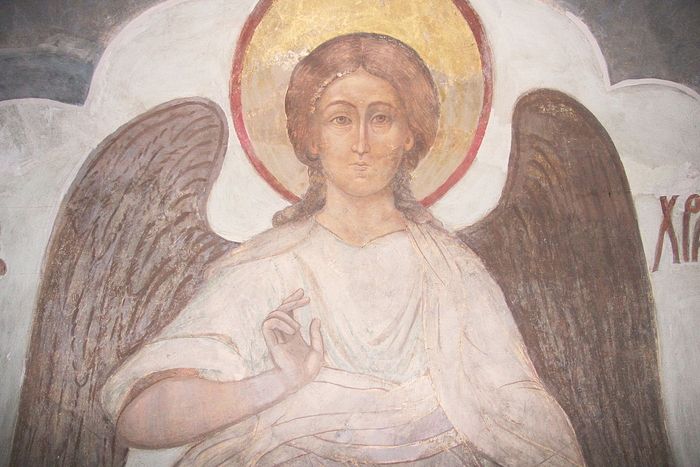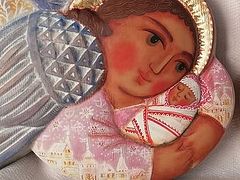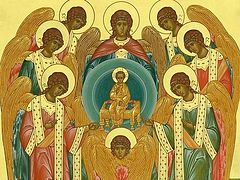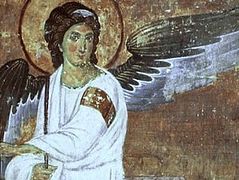The title of this paper is deliberately chosen. The first word of the title–“toward”–has been used because this paper is not a definitive work. Rather it is intended to be an initial step, albeit a very modest one, toward a more significant effort on guardian angels. Therefore, please read the following article, Part 1 of 2, in light of this objective.
Guardian angels, everyone seems to like them. Many believe in them. There are guardian angel books, lapel pins, statues and figurines, music, movies, drawings, and paintings. Sadly, today they are more a novelty and curiosity in the heart of man than a truth. And that is unfortunate.
We ought not to trivialize the subject of guardian angels. Today’s commercialization of guardian angels is not reality. The trivialization of so critical a topic serves Satan’s objectives.
Guardian angels are “companions of the faithful.”1 Guardian angels are our “shepherds”2 with us throughout every second, minute, and hour of every day of our lives. Next to God, our guardian angel knows us better than anyone in our lives since they are with us throughout our lives! Consequently, it would not be surprising to learn that our guardian angels exalt in our spiritual growth. Similarly, they may weep at our spiritual failures.3 We are never abandoned or alone. And this is important because man lives in a supernatural worl—in “spiritual combat between the powers of light and the powers of darkness.”4 One who believes in the Triune God must believe in angels. One who believes in angels must believe in guardian angels. The preceding two premises are not optional considerations. They go to the heart of our Orthodox Christianity.5 It is within this context that this paper is offered.
Defining “Angel”
The word “angel” originates from the Greek angelos, which means “messenger of God.” God created angels. They are: real living beings; supernatural; non-physical; may assume corporeal appearances; and their spirituality is above human experience. The existence of angels is accepted on faith. Knowledge of their existence comes from God, i.e., revelation. Angels have reason and freedom for forming personal moral decisions. As a consequence, angels have (past tense) sinned. Pseudo-Dionysius is credited for the theological groundwork on angelology.
The Creator is very active in His creation. And guardian angels are an essential part of His creation, and they have a role in our lives. Our guardian angel unites us with heaven, with God. We can, given our free will, ignore, misuse, abuse, and refuse our guardian angel. But we do so at our peril. Man requires a greater understanding and appreciation of the significance of guardian angels. This, then, is a framework–a theological beginning–for a doctrine on guardian angels and the role they play in our daily lives.
The Earliest References
“The angel who delivers me from all evils, bless these boys, and my name shall be called upon them, and the name of my fathers, Abraam and Isaac; and let them be increased to a great multitude on the earth.”6 St. Basil takes the angel in the foregoing verse from Genesis to refer to a guardian angel. Indeed not only Moses but also Isaiah7 and Jeremiah8 make references to guardian angels. Of this, Basil states that they know “the angels [are] to be set over men as tutors and guardians [and] calls them to witness.”9 Therefore, our initial theology of a guardian angel and the roles they play in our life stems from the Old Testament prophets.
In referring to the angel who “delivers me from all evils,” Moses attributes his guardian angel a saving, rescuing, or a positive guiding influence. It coincides with Basil’s attribution of the angel being a “guardian”–a protector and overseer, and a “mentor”–a counselor, teacher, and instructor. It is not unlike the role that Socrates ascribes to his guardian angel in Plato’s (ca. 427-347) recount of Socrates’ suicide in the Phaedo. The very fact that Socrates and Plato believed in angels–a concept that could not be empirically proven (a fundamental tenet of Platonic thought10)–meant they were relying on faith. And faith in Platonic thought, unlike Christian belief, was not a virtue. I cite Socrates and Plato because I believe it is essential to know that the concept of guardian angels existed outside the realm of Judaic belief. Indeed, the very idea of angels existed in Zoroastrianism, Hinduism, and Buddhism. The Holy Spirit’s influence is unbounded and affects non-Christians.
The New Testament
The Christian concept of faith is a way of life.11 Faith is trusting and believing in the Triune God and in those promises and creation He has given us. “Faith is the assurance of things hoped for, and the conviction of things not seen.”12 The foundation of our faith–our trusting and believing in the existence of guardian angels–resides in the words of Jesus, wherein the Book of Matthew, He advises “See that you do not despise one of these little ones; for I tell you that in heaven their angels always behold the face of my Father who is in heaven.”13 “Their angels” in this case means “their guardian angels.” And the guardian angels always see the face of God, not in His divine essence, but in His divine glory, His energies. We are learning from this passage, the words of our Saviour, that the primary role of the guardian angel is to minister for those who may inherit salvation.14 It is also important to note that the quotation of Jesus’ words has no limiters, but holds for every person!15 “This is a truth, that each man has an Angel.”16 Indeed, Clement of Alexandria, Origen, Methodius, and Tertullian support the assessment that guardian angels are given to man at birth.17
“They said to her, ‘You are mad.’ But she insisted that it was so. They said, ‘It is his angel!’ But Peter continued knocking; and when they had opened, they saw him and were amazed.”18 With this recounting by the Holy Apostle and Evangelist Luke, we receive an affirmation of Jesus’ words (as also stated above in Matthew). In other words, the early Church in living its faith—its trust and belief in Jesus—is evincing two things: its belief in angels and its belief that angels are assigned to people as guardians. There can be no other logical explanation for St. Luke’s words. Angels exist. Guardian angels exist. Even St. Peter had a guardian angel. So, too, do you—the reader—have a guardian angel.
The words of Luke depict a profound faith in God, the defining virtue of the Christian. We are told that faith in Christ is the one thing most pleasing to God; it is the “work of God” that we should believe in Christ.19 Therefore, we please God by acknowledging His angels and guardian angels. We must never forget that God offers us salvation by the means that are pleasing to Him. And an essential element of His creation is the angels and guardian angels, both of which are here to assist us.
The Apostolic & Church Fathers
The following references to the Apostolic and Church Fathers will be minimal, given the limited scope of this study. Nevertheless, the authorities are of significance and value. It will become evident that there is a thread present in the Fathers' writings. The line begins with the Sicilian, Pantaenus20, a Stoic philosopher who converted to Christianity and became the head of the catechetical school in Alexandria, Egypt. Of Pantaenus, we know little, and of his teachings, we know less. He was an educated cosmopolitan, nevertheless instrumental in ensuring that the catechetical school was a success. And the metric of success is ascertainable by the students it produced. The first and most famous of Pantaenus’ students was Clement of Alexandria21.
Clement of Alexandria is critical to angelology for the following reasons. It is from him that we receive the affirmation that “to know God…is the first step in faith...through confidence in the teaching of the Saviour.” Clement continues, “all men are His,” meaning all men are God’s people. More importantly, he defines “all men” as “Greeks” and “Barbarians.” What Clement is doing is universalizing the faith, much as St. Luke did in his gospel. And it is because of God’s “dispensed…beneficence both to Greeks and Barbarians” that “the angels are distributed among the nations.”22 It is essential to read “among the nations” as meaning beyond the nation of Israel. God’s church is a universal church, for all people who adhere to the “teaching of the Saviour.” That is why “angels are distributed among the nations.” And it will become evident that that is why every person will have a guardian angel, whether Greek or Barbarian.
Clement transcends the breadth of angelic responsibility from nations to the individual man. “[The spiritual man] prays in the society of angels…and he [man] is never out of their holy keeping.”23 From this, it is evident that angelic participation with man is intimate and personal. Therefore, though a man may appear to be praying alone, he is not alone.
About Matthew 18:10, “of the little ones, and of the least, which see God,” Clement makes explicit reference to “the oversight reaching to us exercised by the tutelary angels.” In this case, “tutelary angels” means guardian angels. Here Clement is interpreting Matthew 18:10, the words of our Saviour, to affirm Christ’s revelation that we each have guardian angels.24
To appreciate the significance of Clement of Alexandria, we must recognize that he was probably an Athenian. He, as with Pantaenus, eventually became a teacher at the catechetical school in Alexandria, Egypt. Clement became a defender of the faith against Gnosticism, albeit his liberal tendencies promoted Christian gnosis. Despite this error, his contribution to angelology was significant since his writings were probably reflective of the community of Christian believers. Origen25 was Clement’s most outstanding pupil.
Origen, perhaps the greatest of the early church fathers considering his theological contributions, too contributed an exegesis of Matthew 18:10.
All…things were disposed, as I have said, not indiscriminately and fortuitously, but by a most appropriate and just decision of God, who arranged them according to deserts, in accordance with His own approval and judgment: so that one angel the Church of the Ephesians was to be entrusted; to another, that of the Smyrnaeans; one angel was to be Peter’s, another Paul’s; and so on through every one of the little ones that are in the Church, for such and such angels as even daily behold the face of God must be assigned to each one of them; and there must also be some angel that encampeth round about them that fear God. All of which things, assuredly, it is to be believed, are not performed by accident or chance, or because they (the angels) were so created, lest on that view the Creator should be accused of partiality; but it is to be believed that they were conferred by God, thee just and impartial Ruler of all things, agreeably to the merits and good qualities and mental vigour of each individual spirit.26
What Origen’s exegesis is tells us is that nothing, regarding the angels, has occurred by accident. God has no accidents. As stated in the introduction of this paper, God is intimately involved in His creation and has planned everything as it exists. Therefore, as nation’s have angels assigned to them, so do churches and each person. We see to this point the harmony of Clement and Origen regarding the words of our Saviour.
But Origen goes beyond Clement and proffers three further statements: each individual is “attended” by a guardian angel, a warning that an unworthy individual could lose their guardian angel, and we must listen to the “admonitions” of our guardian angel.
Each believer, although the humblest in the Church, is said to be attended by an angel, who is declared by the Saviour always to behold the face of God the Father, and as this angel was certainly one with the object of his guardianship; so, if the latter is rendered unworthy by his want of obedience, the angel of God is said to be taken from him, and then that part of him—the part, viz., which belongs to his human nature—being rent away from the divine part, is assigned a place along with unbelievers, because it has not faithfully observed the admonitions of the angel allotted it by God.27
While every person may have a guardian angel attending to his or her needs, we best not take the guardian angel for granted lest we lose it and be “assigned to a place with unbelievers.” This is the most precise and most succinct articulation, aside from our Saviour’s words, regarding universal individual guardian angels.
We cannot overstate the importance of Matthew 18:10. In Origen’s Commentary on Matthew, he states that “the angel of the Lord encamps round about them that fear Him and delivereth them…and, so long as we are imperfect, and need one to assist us that we may be delivered from evils, we need an angel of whom Jacob said, ‘The angel who delivered me from all evils.’”28 Our guardian angel is here to protect us and will do so providing we listen to it. Again Origen is warning us, so long as we are imperfect (and we always will be imperfect) we are in “need of one to assist us.” As I stated in the introduction, please do not take your guardian angel for granted! You cannot succeed alone.
It is for this reason that we must “[entrust] ourselves to the Supreme God through Jesus Christ, who has given us such instruction and asking of Him all help, and the guardianship of holy and good angels, to defend us from the earth-spirits intent on lust, and blood, and sacrificial odours, and strange sounds and other sensual things!”29
Origen has been called the “father of Christian theology” and for a good reason, as I hope is partially evident above. A student of Clement of Alexandria, he succeeded Clement as the head of the catechetical school in Alexandria. The most prolific writer of the pre-Nicene period, his efforts reflect brilliant spiritual insights. In 250 A.D., when the emperor Decius was persecuting Christians, Origen was imprisoned and tortured for one year, only to be released in 251 A.D. upon Decius’ death. Origen withstood the tortures and never recanted his Christian beliefs. However, he would die soon after his release, his death being caused by the tortures he endured. Origen’s doctrinal and apologetic efforts numbered over 2000 works.30 Perhaps Origen’s most famous student was St. Gregory The Wonderworker.31
St. Gregory, too, acknowledged the existence and role of guardian angels—particularly his guardian angel that led him to Origen.
“But let this word of ours be taken primarily as an eucharistic address in honour of this sacred personage, who stands alone among all men; and if I may seek to discourse of aught beyond this, and, in particular, of any of those beings who are not seen, but yet are more godlike, and who have a special care for men, it shall be addressed to that being who, by some momentous decision, had me allotted to him froth my boyhood to rule, and rear, and train,--I mean that holy angel of God who fed me from my youth, as says the saint dear to God, meaning thereby his own peculiar one.
…
But we, in addition to the homage we offer to the Common Ruler of all men, acknowledge and praise that being, whosoever he is, who has been the wonderful guide of our childhood, who in all other matters has been in time past my beneficent tutor and guardian. For this office of tutor and guardian is one which evidently can suit neither me nor any of my friends and kindred; for we are all blind, and see nothing of what is before us, so as to be able to judge of what is right and fitting; but it can suit only him who sees beforehand all that is for the good of our soul: that angels, I say, who still at this present time sustains, and instructs, and conducts me; and who, in addition to all these other benefits, has brought me into connection with this man [Origen], which in truth is the most important of all the services done me.32
St. Gregory is paying great homage to his guardian angel, who has had to “rule, and rear, and train” and “fed” him from his youth. Gregory attributes his guardian angel with the roles of being his “beneficent tutor and guardian.” As highly as Gregory holds Origen, it is probably worth saying that his emotions, while perhaps influencing the inflection of his language, are not influencing the essence of his beliefs. On the contrary, Gregory is manifesting his spiritual beliefs in his words. There should be no doubt that he believes he is indebted to his guardian angel.
It is worth noting that Gregory was not raised in a Christian family. His family was financially reasonably well to do, and this afforded him a legal education in Athens and Berytus, the latter being the “mother and nurse” of Roman civil law. During his time at Berytus, Gregory was moved by his guardian angel to travel to Palestinian Caesarea where he would meet Origen. As a student of Origen “he received lessons in logic, geometry, physics, ethics, philosophy, and ancient literature, and in due time also in biblical science and the verities of the Christian faith.”33 Gregory would eventually go on to become the bishop of his hometown, Neo-Caesarea.
I believe it is important to note that Gregory was a student in the mode of learning and acquiring knowledge for a lengthy period. While we do not know the exact length of time he was a student, he did study at least from 219 A.D. (if not before) through 238 A.D., when, after spending five years with Origen, they went their separate ways. He was willing, if not wanting, to learn. And this quality no doubt empowered his guardian angel to rule, rear, train, and feed him. Gregory went on to become a faithful servant of God, no doubt guided by his guardian angel.34
Canon To The Guardian Angel
Troparion
O Angel of God, my holy Guardian, keep my life in the fear of Christ God,
strengthen my mind in the true way and wound my soul with heavenly love,
so that guided by Thee, I may obtain the great mercy of Christ God.





